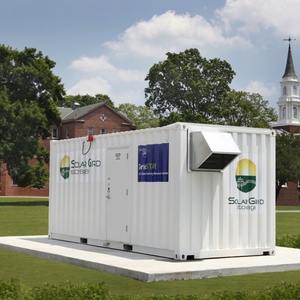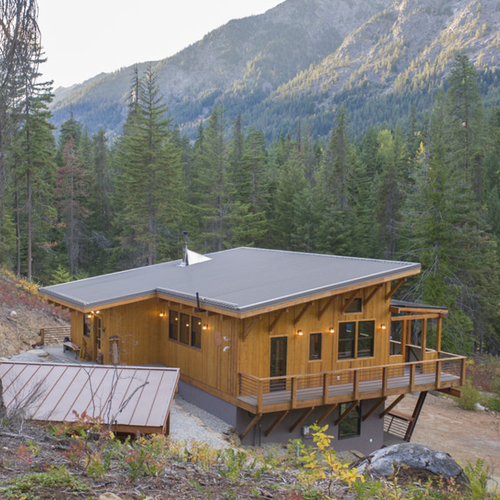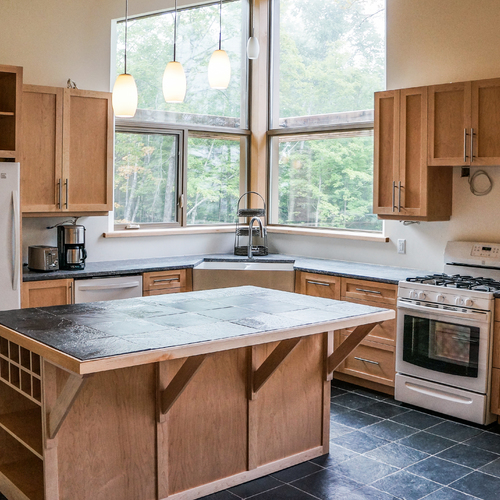
An effective response to our climate crisis will require us to transition away from the burning of fossil fuels. With luck, current trends—including the gradual greening of our electricity grid—will accelerate, as our country installs more wind turbines and photovoltaic arrays, and as electric utilities continue to shut down obsolete coal-burning power plants. At the same time, we can only hope that an increasing percentage of our country’s vehicles will be powered by batteries, and that homeowners continue to retire appliances fueled by gas or oil in favor of electric appliances.
This transition to an all-electric future is easier for grid-connected households than off-grid households. Most off-grid homeowners depend on combustion for space heat and lack a dependable supply of year-’round electricity. That’s why off-grid homeowners are unlikely to buy an electric vehicle or install an air-source heat pump. (For more information on this topic, see “Off-Grid Homeowners Contemplate Our All-Electric Future.”)
I’ve lived in an off-grid house in Vermont for 46 years. But two years ago, my wife and began looking into the possibility of hooking up to the grid.
Why did we do it?
We’re now on the grid, and we’re glad we are. Grid-tied houses are far more environmentally friendly than off-grid houses. Once a house is connected to the grid, there’s no need to operate a gasoline-burning generator during the cloudy days of winter. Fortunately, Vermont’s electricity grid is a low emitter of carbon—so our grid electricity is much cleaner than the electricity produced by a Honda generator.
When our current gasoline-fueled vehicle reaches the end of its natural life, we hope to replace it with an electric vehicle—further reducing our carbon footprint.
While it’s excellent news that hooking up to the grid will lower…
Weekly Newsletter
Get building science and energy efficiency advice, plus special offers, in your inbox.

This article is only available to GBA Prime Members
Sign up for a free trial and get instant access to this article as well as GBA’s complete library of premium articles and construction details.
Start Free TrialAlready a member? Log in















11 Comments
Great article Martin. Thank you for sharing your personal journey over the years. Yours has been an enlightening outlook, and the discussion about the difficulty of low-carbon off-grid living especially. Welcome to civilization.
Peter,
When Mahatma Gandhi visited London, a reporter asked him, "What do you think of Western civilization?"
Gandhi answered, "I think it would be a good idea."
This is a timely and interesting article as evidence of the dire consequences (especially for the poorest of humanity) of rapid climate change becomes more and more obvious.
I am curious about the relative costs of burying power lines versus stringing lines above ground. In our area they are using these new pulling machines that can pull power cables through ground for relatively long distances...and we have a lot of shale around here.
I wonder if eventually there will be an electric car or truck that can be set up to realistically to act as the battery back up for a PV system and that can get topped up on the grid-either at home or at a commercial supercharger.
Nick,
Q. "What are the relative costs of burying power lines versus stringing lines above ground?"
A. In most cases, utility poles are cheaper -- but there are many variables that can tip the scales the other way. Factors to consider include how many trees need to be cut to allow poles to be installed, how wide a swath through your forest needs to be cut and maintained, whether you are bothered by the visual pollution of poles, how deep you have to bury the lines, whether or not your soil has ledge rock or boulders, whether you are worried about service interruptions from storms (which affect above-ground lines more than buried lines), and whether or not contractors are even available to bury the lines. So seek local advice.
Q. "Will there eventually be an electric car or truck that can be set up to realistically to act as the battery back up for a PV system and that can get topped up on the grid-either at home or at a commercial supercharger?"
A. My prediction is yes (the electric F-150 Ford Lightning pickup truck that will be available in a year or two may have some of these features). But it will still be impossible for off-grid homeowners to keep their Ford pickup charged during the dark days of winter -- unless they always keep enough of a charge in the vehicle to drive to town, and they're willing to sit in the cab of their truck while it gets charged up.
Martin,
The last time we moved - some 30 years ago, my wife started to cry when we locked up our old house. She was confused by why. We were looking forward to living in our new place which we had built together, and starting another chapter of our lives. That evening when we had time to stop and think about it, we realized that being able to leave the old place without any emotion would mean the time we spent there hadn't been significant for us - that the memories weren't important.
So I'm glad you feel a loss. But I'm also glad that you brought the same clear-eyed thinking to your situation that you has been so helpful to us at GBA. What did Samuel Beckett say? “You must go on. I can't go on. I'll go on.”
Malcolm,
Thanks for sharing your story. I think that the loss we feel at giving up on the off-grid lifestyle is small in comparison with the loss one feels at walking away from a cherished home. I'm glad we are still in our house, surrounded by our vegetable gardens and fruit trees, and I'm glad that we will continue to live here as long as we are able.
Good read Martin!
Thanks. Well said...Our electric utilities and grids may be our most important modern technology...
Almost all the work my group (Kageno) does in Africa is "off the grid". As in your case, the "grid" is inching closer, but it will take a few more years before it gets to the remote villages we work in. These villages have some cell service and enough solar panels to charge phones and a few computers, so the villages have communications with the outside world . But the lack of regular reliable electricity impacts so much.....from how and what people eat to the kind of health care available (and that we can bring in). It also impacts the rhythms of daily life: with more packed into the daylight hours and families spending more time at home at night.
I grew up during the 70’s/80’s with 1 foot in the wilds of Boston (Dartmouth St/South End) and the other in greater down east Maine (Bucks Harbor, Machiasport).
Boston house was typical 4 floor brick structure as part of a city block, usual modern conveniences of MaBell, electricity, city water, and Boston gas.
Bucks Harbor was none of that, just a drafty house, Aladdin kerosene lamps/candles, 2 galvanized metal buckets to fetch water in, and firewood, lots of firewood……
Boston was where we lived, worked, went to school; Maine school vacations, long weekends, all summer for mom, sister and I, dad coming up every Friday night and leaving early Monday morning.
Parents divorced ‘77, I made choice to follow the old man up to Maine in early 80’s and live with him. I was a car nut, obsessed really, and there was zero chance of ever getting a license much driving in Boston until who knows when. In Maine you could take drivers Ed at 14 (and was already driving around village when we were 11-12).
Off to Maine I went to stay for good. The old man said, well looks like I’ve got running water now. How’d you do that dad, no electricity? Handed me the buckets and said run to the well and fill them up so you can do the dishes, and get some wood in to heat the water…..
Got an axe handle for Christmas that year.
To this day I hate washing dishes but will split wood all day long. Though I wish could back in time and get some of those straight clear lengths of beach, ash, and oak; if only I knew then….
Still live in Maine, bit further down the coast from the old man but still close enough to visit.
30 years on and I still can not get used to the sound of the fridge running or a toilet flushing in the night. Utter and true absence of the noise created by “progress” is something that too few ever really experience.
I have greatly appreciated you perspective on off grid life over the years. This feels like a natural step based on many of your insights. I have talked to so many people over the years with a very whimsical (and poorly informed) notions of going off grid. Your writing has helped me pass along some of that perspective in those moments. Thanks.
Glad you were able to join the crowd Martin without looking back!
I certainly remember my offgrid years in CO in 81-83, old car batteries and 50w panels that cost an arm and a leg. When we installed our pv in WI I really didn't want the lines to be rubbing on the garage anymore so did the 120' of trenching myself with a shovel. Just to drop in the line cost us $3K! Needless to say I still hate the grid keepers...
Log in or become a member to post a comment.
Sign up Log in